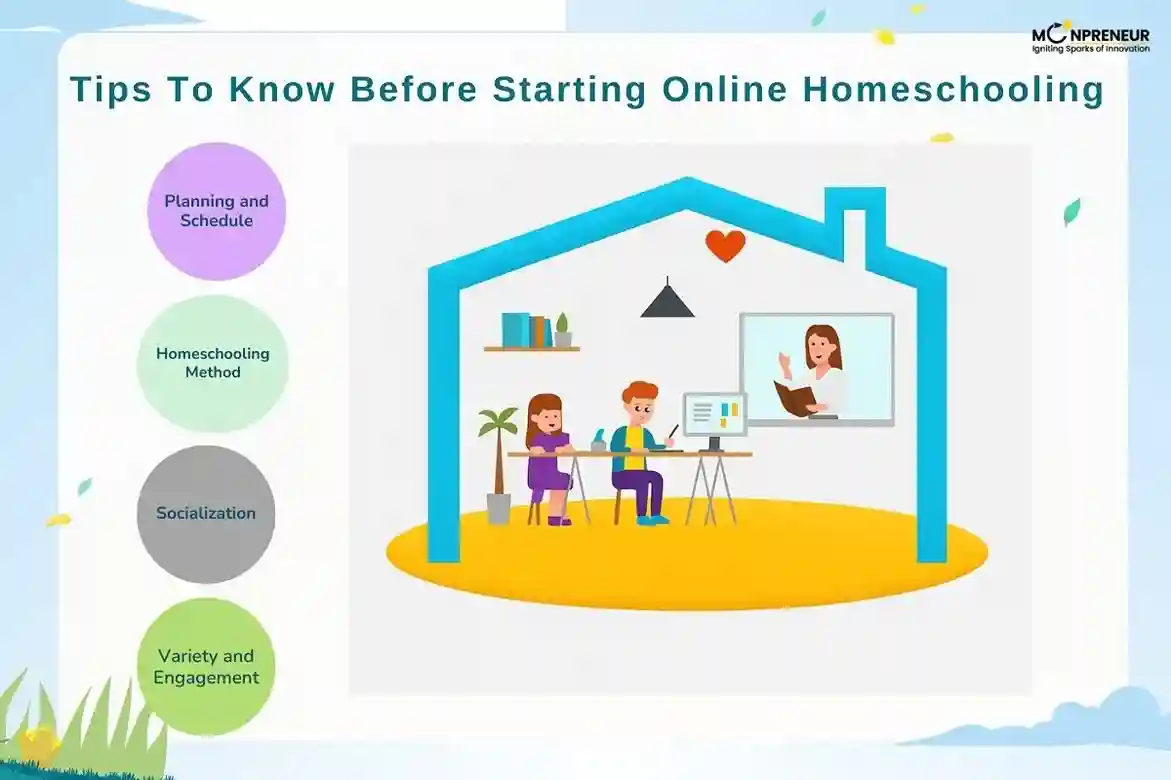Introduction
Homeschooling is more than just an alternative to traditional schooling—it is a journey full of unique experiences, discoveries, and opportunities for growth. For parents, it means tailoring their child’s education in a way that matches their strengths, weaknesses, and interests. Starting online homeschooling for the first time may feel like standing at the edge of a vast, unexplored cliff—exciting yet overwhelming. Questions like “Where do I begin?” or “How do I make this work for my child and my family?” are natural. This blog provides practical tips that will help you create a successful homeschooling journey for your child.

1. Understand What Online Homeschooling Means
2. Know the Legal Requirements
Before you dive in, it’s important to clearly understand what homeschooling is. It refers to the dedicated learning approach where parents take responsibility for their child’s education at home instead of sending them to traditional schools. Online homeschooling combines digital resources with parental guidance, offering flexibility, customized curriculum, and a safe environment. It allows children to learn at their own pace, while parents ensure the learning is meaningful and personalized.
Homeschooling laws vary across regions and states, so it’s vital to understand the legal framework in your area. Some states require registration, documentation, or standardized assessments, while others are more flexible. Research your local homeschooling regulations to avoid future complications. Keeping necessary records and notifying the concerned authorities (if required) ensures a smooth start.
3. Create a Structured Homeschooling Plan
4. Design a Productive Learning Space
A strong plan forms the backbone of successful homeschooling. Ask yourself:
- What academic goals should my child achieve this year?
- Which skills and personal qualities do I want them to develop?
A clear roadmap helps you set achievable milestones. Choosing the right curriculum is equally important. Look for flexible programs that align with your child’s learning style, whether CBSE, ICSE, IGCSE, GCSE, or international curriculums like A Levels. This ensures your child receives both global exposure and personalized education.
A dedicated study area can make a big difference in focus and motivation. This doesn’t need to be elaborate—it can be a quiet corner with a desk, comfortable chair, and good lighting. Equip the space with all necessary supplies like books, stationery, and digital tools. Personalize the area with motivational posters, educational charts, or your child’s artwork to inspire creativity. A well-organized study space helps children mentally separate learning from leisure.
Recommended Reading: Game Development with Roblox – What You Need to know
5. Establish a Daily Routine
6. Explore Different Teaching Methods
Flexibility is a big advantage of homeschooling, but without structure, children may get distracted. Create a routine that balances academic subjects, extracurricular activities, outdoor play, and relaxation. Include breaks between study sessions to prevent burnout. A consistent schedule not only builds discipline but also provides children with a sense of stability and flow throughout the day.
Recommended Reading: How to Make Money from Game Development
Every child learns differently, and homeschooling gives you the chance to adapt teaching methods to their unique style. Common approaches include:
- Visual learners: Using videos, diagrams, and charts.
- Auditory learners: Benefiting from discussions, audiobooks, and interactive lectures.
- Kinesthetic learners: Excelling through hands-on experiments, outdoor exploration, and DIY projects.
By experimenting with these styles, parents can create engaging and dynamic lessons that keep children motivated.
7. Keep Children Motivated
8. Use Resources and Tools Wisely
Motivation is key in homeschooling. Unlike traditional classrooms, where peer influence often drives learning, homeschoolers rely heavily on encouragement from parents. Celebrate small achievements, provide constructive feedback, and make learning fun through storytelling, art, or gamified lessons. Tailor activities to your child’s interests so they enjoy the process rather than viewing it as a chore.
Take advantage of digital platforms and offline tools to make homeschooling more effective. Online platforms like Khan Academy, Coursera, and educational apps offer interactive learning opportunities. Pair these with books, creative projects, and hands-on activities to create a balanced learning experience. The goal is to mix technology with real-world applications, ensuring children not only gain knowledge but also learn how to apply it in everyday life.
9. Balance Academics with Life Skills
10. Focus on Socialization and Parental Well-being
Homeschooling should not focus only on academics—it’s also about preparing children for real life. Teach them essential skills like problem-solving, time management, organization, and critical thinking. Involve them in daily tasks such as budgeting, cooking, or planning projects. These experiences build independence, responsibility, and decision-making abilities, which are as valuable as academic knowledge.
A common misconception about homeschooling is that children miss out on social interaction. In reality, there are plenty of ways to ensure social growth. Join homeschooling groups, organize playdates, participate in workshops, or encourage your child to join extracurricular clubs. At the same time, remember that homeschooling is also a commitment for parents. Managing lessons, housework, and personal responsibilities can feel overwhelming. Connect with other homeschooling families for support, share responsibilities, and don’t hesitate to take breaks when needed. A calm and balanced parent is the foundation of a successful homeschooling journey.
Conclusion
Homeschooling is more than an educational choice—it’s a lifestyle shift. While the beginning may feel overwhelming, the process becomes rewarding with patience, creativity, and adaptability. By setting realistic goals, using the right resources, and fostering both academics and life skills, parents can create a fulfilling experience for their children. Remember, homeschooling is not about replicating traditional schools at home—it’s about creating an environment where children learn with curiosity, independence, and joy.
Moonpreneur is on a mission to disrupt traditional education and future-proof the next generation with holistic learning solutions. Its Innovator Program is building tomorrow’s workforce by training students in AI/ML, Robotics, Coding, IoT, and Apps, enabling entrepreneurship through experiential learning.
























